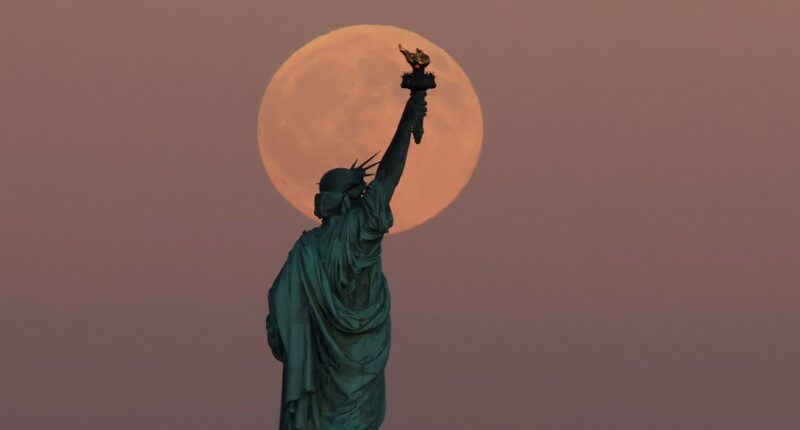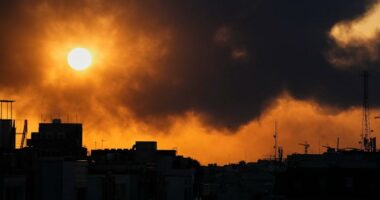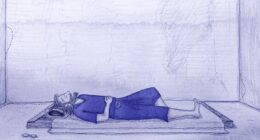Share this @internewscast.com
(The Conversation) – Have you ever found yourself unable to drift off on a night when the full moon bathes the world in its silvery light and wondered if its luminescence is the culprit? For ages, people have believed that the Moon’s power extends beyond mere illumination, stirring sleepless nights and peculiar behaviors, even to the point of inciting madness. The term “lunacy” itself originates from the Latin word “luna,” meaning Moon.
It’s not uncommon for police officers, hospital personnel, and emergency responders to claim that their workloads increase when the full moon is out. But does scientific evidence support these claims?
As is often the case, the truth is more layered than folklore suggests. While research indicates that a full moon might have a slight impact on sleep patterns, its effects on mental health are far less definitive.

As a neurologist with a focus on sleep medicine, I explore how sleep influences brain health. The idea that an old myth about moonlight causing madness might simply stem from restless, moonlit sleep is intriguing to me.
What the full moon really does to sleep
Research has shown that during the days leading up to a full moon, when its light is most intense in the evening sky, people’s sleep patterns do indeed change. Studies reveal that during this time, individuals tend to sleep approximately 20 minutes less, take longer to fall asleep, and spend reduced time in deep, restorative sleep. This pattern is confirmed by large-scale studies across various cultures, which find that people tend to go to bed later and enjoy shorter sleep durations in the nights preceding a full moon.
The most plausible explanation for these changes is light exposure. An intense moonlight evening can delay the body’s internal clock, decrease levels of melatonin—the hormone that signals it’s time to sleep—and keep the brain in a heightened state of alertness.
The changes are modest. Most people lose only 15 to 30 minutes of sleep, but the effect is measurable. It is strongest in places without artificial light, such as rural areas or while camping. Some research also suggests that men and women may be affected differently. For instance, men seem to lose more sleep during the waxing phase, while women experience slightly less deep and restful sleep around the full moon.
The link with mental health
For centuries, people have blamed the full moon for stirring up madness. Folklore suggested that its glow could spark mania in bipolar disorder, provoke seizures in people with epilepsy or trigger psychosis in those with schizophrenia. The theory was simple: lose sleep under a bright moon and vulnerable minds might unravel.
Modern science adds an important twist. Research is clear that sleep loss itself is a powerful driver of mental health problems. Even one rough night can heighten anxiety and drag down mood. Ongoing sleep disruption raises the risk of depression, suicidal thoughts and flare-ups of conditions like bipolar disorder and schizophrenia.
That means even the modest sleep loss seen around a full moon could matter more for people who are already at risk. Someone with bipolar disorder, for example, may be far more sensitive to shortened or fragmented sleep than the average person.
But here’s the catch: When researchers step back and look at large groups of people, the evidence that lunar phases trigger psychiatric crises is weak. No reliable pattern has been found between the Moon and hospital admissions, discharges or lengths of stay.
But a few other studies suggest there may be small effects. In India, psychiatric hospitals recorded more use of restraints during full moons, based on data collected between 2016 and 2017. In China, researchers noted a slight rise in schizophrenia admissions around the full moon, using hospital records from 2012 to 2017. Still, these findings are not consistent worldwide and may reflect cultural factors or local hospital practices as much as biology.
In the end, the Moon may shave a little time off our sleep, and sleep loss can certainly influence mental health, especially for people who are more vulnerable. That includes those with conditions like depression, bipolar disorder, schizophrenia or epilepsy, and teenagers who are especially sensitive to sleep disruption. But the idea that the full moon directly drives waves of psychiatric illness remains more myth than reality.The sleep/wake cycle is synchronized with lunar phases.
Other theories fall short
Over the years, scientists have explored other explanations for supposed lunar effects, from gravitational “tidal” pulls on the body to subtle geomagnetic changes and shifts in barometric pressure. Yet, none of these mechanisms hold up under scrutiny.
The gravitational forces that move oceans are far too weak to affect human physiology, and studies of geomagnetic and atmospheric changes during lunar phases have yielded inconsistent or negligible results. This makes sleep disruption from nighttime light exposure the most plausible link between the Moon and human behavior.
Why the myth lingers
If the science is so inconclusive, why do so many people believe in the “full moon effect”? Psychologists point to a concept called illusory correlation. We notice and remember the unusual nights that coincide with a full moon but forget the many nights when nothing happened.
The Moon is also highly visible. Unlike hidden sleep disruptors such as stress, caffeine or scrolling on a phone, the Moon is right there in the sky, easy to blame.
Lessons from the Moon for modern sleep
Even if the Moon does not drive us “mad,” its small influence on sleep highlights something important: Light at night matters.
Our bodies are designed to follow the natural cycle of light and dark. Extra light in the evening, whether from moonlight, streetlights or phone screens, can delay circadian rhythms, reduce melatonin and lead to lighter, more fragmented sleep.
This same biology helps explain the health risks of daylight saving time. When clocks “spring forward,” evenings stay artificially brighter. That shift delays sleep and disrupts circadian timing on a much larger scale than the Moon, contributing to increased accidents and cardiovascular risks, as well as reduced workplace safety.
In our modern world, artificial light has a much bigger impact on sleep than the Moon ever will. That is why many sleep experts argue for permanent standard time, which better matches our biological rhythms.
So if you find yourself restless on a full moon night, you may not be imagining things – the Moon can tug at your sleep. But if sleeplessness happens often, look closer to home. It is likely a culprit of the light in your hand rather than the one in the sky.











